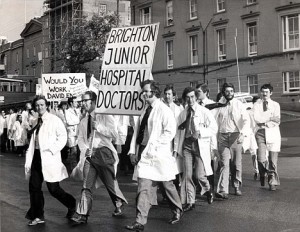 Pick an analogy: a frog slowly boiling, a camel’s nose inside the tent, a slippery slope. Too often, we accept small changes and wake up with disaster, a camel in our tepee.
Pick an analogy: a frog slowly boiling, a camel’s nose inside the tent, a slippery slope. Too often, we accept small changes and wake up with disaster, a camel in our tepee.
Canadians hate rigid thinking. We avoid fights and love compromise. This makes us pions to activist governments.
Medicine faces an existential threat in Ontario.
Do not listen to the wise, old doctors who say,
“Relax. The pendulum swings. Seven fat years followed by seven lean. Don’t get your knickers in a knot. All good things come to those who wait….”
People who spew such nonsense, in light of the current Ontario government, are, with great respect, deluded.
Premier Wynne is no pendulum; she’s a juggernaut.
The Wynne Liberals propose changes faster than anyone can respond. The Liberals want a revolution in healthcare; a completely different way for patients to access care.
And they want the government at the centre of their new world order.
The examples of this government’s abuse of power would run pages long. Consider just the following:
Bill 210 completely revolutionizes primary care. The government wrote this with no input from working physicians. Bill 210 turns doctors into civil servants beholden to local bureaucrats.
Doctors will be paid to do what bureaucrats tell them to do, not what patients want. Every schedule change, every hour of patient care, must be reported, and approved by, local bureaucrats.
The government will hire an army of bureaucrats to staff the new ‘sub-LHINs’ and manage all the doctors under their care.
Bill 119 gives government broad access to patient records. Defenders of this bill insist that the government always could come to a doctor’s office and look at charts, but this is not clear (or even true apparently).
Even so, in the days of paper charts, sensitive bits of data, for example, an HIV test, might not be handed to the bureaucrat demanding a chart. With electronic medical records, it’s all available to government with a mouse click.
As with Bill 210, the government ignored input from physicians.
On top of this, the Liberals have cut hospital funding 9 years in a row and have cut 1400 nursing positions despite a growing and aging population.
Will Medicine Survive?
The Ontario Liberal government is attacking medicine. They want voters to believe it’s all about doctor and nurse incomes, but it’s not about money.
It’s about control.
Of course money is involved. It always is.
But politicians and social reformers love power more than money. They want command: absolute jurisdiction over how and when doctors work.
They believe that they know best whether a doctor should stay late in the office, or go on a house call. They want to control when doctors take breaks and how they pay clinic staff.
Government wants to make doctors accountable to government. They want to force doctors to order fewer tests, and do more preventive care, in return for little bonuses.
Patients’ needs do not matter; government knows what patients need.
Honest Politicians
Coercive Utopians won a majority in 2014. Voters gave most of the seats in parliament to an activist government. Honest politicians are humbled that only a minority of citizens vote. They know that a ‘majority’ government gets control of parliament from the support of a minority of citizens.
Honest politicians believe that forming government means serving and listening to all the people.
But not the Wynne Liberals. They act like any other democratically elected dictatorship.
Premier Kathleen Wynne is not a centrist. She’s a woman on a mission with a long list of things she wants to get done. She does not believe that representative democracy carries the duty to represent all voters.
She thinks that a ‘majority’ gives her the right to trample on anyone who does not agree with her. She steamrolls her bills through parliament without any adjustments or feedback from others.
Fair and Reasonable
Doctors need to assess how ‘fair and reasonable’ is working with this government. They need to look beyond negotiations and consider what’s crumbling around them.
- Who should lead medicine?
- How should decisions be made?
- Have unilateral actions, sham ‘consultations’, and cowboy legislation ever worked well, outside of totalitarian regimes?
Canadian doctors hate fighting. I get it. I am Canadian. I thrive on diplomacy. But, how’s that working for you, doctors?
I’m at my wits end. I am tired of making excuses for doctors being ‘fair and reasonable’ in the face of tyranny.
Things will change irreversibly in Ontario, over the next 12 months. Doctors could make a difference. But I suspect they won’t.
Will medicine survive, as we know it, in Ontario? Will patients appreciate the doctors they find in their tent when Premier Wynne gets done with her revolution?
photo credit: bbc.com


